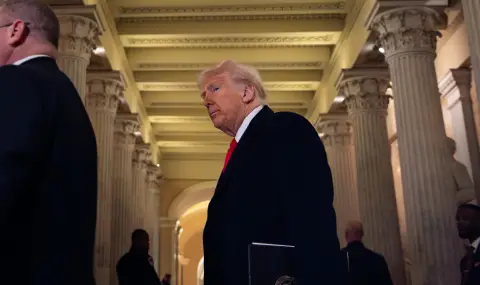US President Donald Trump will meet for the first time today with Japanese Prime Minister Shigeru Ishiba. The two will work to strengthen business and security ties amid concerns about the rise of China, Reuters reports, BTA reports.
The agency notes that their meeting will take place at a time when an escalating trade war is putting the global economy at risk.
Trump, who in three weeks as president has shattered established norms and shaken up foreign capitals from Ottawa to Bogota, has taken a more conventional approach to long-standing allies in the Asia-Pacific region, including Japan, South Korea, Australia and the Philippines.
However, the friendly relations between these countries could be tested, as Trump's disputes with China over synthetic opiates and his warnings of tariffs against other countries, including Japan, risk destroying trade ties in Asia and beyond.
Trump imposed a 10% tariff on all goods imported from China - part of his "opening salvo", as he called it, in the clash between the world's two largest economies, which has forced consumers and businesses to adjust to new conditions.
Japan is particularly dependent on its trade with other countries: the country is a major exporter and relies on imports for most of its natural resources and food products, with many of the country's companies heavily dependent on China.
Tokyo shares Trump's national security team's hawkish view of China regarding Beijing's global ambitions and its extensive territorial claims in Asia, including the important island of Taiwan, which is a chip producer.
At the same time, Japanese officials are wary of Beijing's possible attempts to win over the US president with promises of cooperation on important issues, including trade. Days before taking office, Trump spoke with Chinese President Xi Jinping and told him they would soon discuss the tariffs.
Japanese officials said they were willing to work with Trump administration officials who are more aggressive toward China, such as Secretary of State Marco Rubio and National Security Adviser Michael Walz, but were not confident about negotiating with those in the administration who have strong trade ties to Beijing, including billionaire Elon Musk, who has amassed significant power in Washington.
Trump and Ishiba are expected to hold a joint press conference this afternoon.
For Tokyo, the visit to the White House so soon after Trump took office is a promising signal from the new administration.
"There are two foreign leaders who have been received in the Oval Office," said Rahm Emanuel, Biden's ambassador to Tokyo. "This is the Bibi Netanyahu of Israel, as well as Japan. So that's a good sign," he added.
Trump had a close relationship with the late Japanese Prime Minister Shinzo Abe, but has yet to establish ties with Ishiba, who came to power in October. That's something Japanese officials want to change and plan to invite Trump to visit Japan.
The Japanese side is expected to hold talks during their meeting to avoid imposing tariffs. Other topics likely to be discussed include increased investment in U.S. manufacturing, semiconductor chips, and artificial intelligence.
"The Japanese are definitely thinking about how to reduce the deficit and create jobs in the U.S. in the manufacturing sector, which is of particular interest to Donald Trump," said Kenneth Weinstein, director of the Japan program at the Hudson Institute in Washington.
There are also tensions on issues outside of trade, such as the attempted acquisition of U.S. Steel by Japan's Nippon Steel. Former President Joe Biden blocked the deal but delayed its implementation pending legal action, and Trump has also vowed to block the deal.
According to another informed source, the two leaders are expected to formally agree on a way of working that highlights their alliance and their shared views on economic and security issues, including China and Taiwan.
